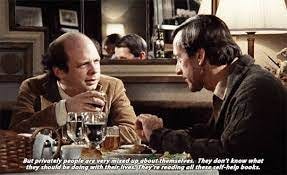Open Mike Eagle and Psychopathy (unrelated)
Also, you can be anyone you want after covid. Maybe change your name to Wes. Or Taurus.
It helps a lot when you interact with the podcast. Subscribe, download, rate, and review. Helps a lot. Use the magical linktree!
Mike Eagle, subject of the episode out this morning, is fast becoming the Andre Gregory to my Wallace Shawn.
I’ve interviewed him maybe three times on my show Wits, which was an on-stage thing, and once before on The Hilarious World of Depression. Also hosted a limited-run podcast with him about Adventure Time. I keep returning to the well and either he must get something out of it too or is just very polite.
I’m re-interviewing some folks on the new show that I’ve interviewed on the old show but not just because the booking process is smoother. The new interviews are inspired by significant changes in that person’s life. In Mike’s case, it was seismic. Since we last spoke on tape, he lost his TV show, marriage ended, moved into a small apartment, and put out a new album based around hitting that brick wall. He’s dealt with a lot of anxiety in his life and I knew that losing a home was a big deal to him.
In coming weeks, I talk to some more guests I’ve talked to before. Peter Sagal, who was adrift after a brutal divorce, is now remarried with a baby. Jenny Lawson, who was pretty darn anxious the last time we did an interview, now has a bookstore (which I think would be incredibly anxiety producing) and has gone through TMS treatment. I wanted to know what that was about. Jenny’s on the show next week.
Randomly ran across these videos on YouTube. Well, semi-randomly because they were served up by a YouTube algorithm based on other things I’d been watching. Okay, not randomly at all, just that I had nothing to do with it.
It’s about being a psychopath. So very many mental health terms get misused in common parlance but “psychopath” might get it the worst. Probably egged on by the Hitchcock movie, we assume someone who is a psychopath - or has psychopathy - is a murderer or is somehow out of control in the world and causing harm to people. Not necessarily so. This is part one of a series of really fascinating videos that, mercifully, do not allow comments. The woman in the videos is a lawyer who writes under the name M.E. Thomas.
Part two has a really interesting anecdote about taking a bicycle that doesn’t belong to her.
Always interesting, always useful to understand the conditions behind an action instead of just the action itself.
What’s the difference between a sociopath and a psychopath? I didn’t know so I looked it up. Here’s what WebMD says:
A key difference between a psychopath and a sociopath is whether he has a conscience, the little voice inside that lets us know when we’re doing something wrong, says L. Michael Tompkins, EdD. He's a psychologist at the Sacramento County Mental Health Treatment Center.
A psychopath doesn’t have a conscience. If he lies to you so he can steal your money, he won’t feel any moral qualms, though he may pretend to. He may observe others and then act the way they do so he’s not “found out,” Tompkins says.
A sociopath typically has a conscience, but it’s weak. They may know that taking your money is wrong, and they might feel some guilt or remorse, but that won’t stop their behavior.
Both lack empathy, the ability to stand in someone else’s shoes and understand how they feel. But a psychopath has less regard for others, says Aaron Kipnis, PhD, author of The Midas Complex. Someone with this personality type sees others as objects he can use for his own benefit.
And also, because it’s WebMD, they all have cancer. Because everything on WebMD leads to cancer. Not really. That’s my joke. About cancer. And psychopathy. Good one, Moe.
Interesting, I think, that the term “psycho” is so freely used and never even really condemned but no one ever says, “That guy is a total socio.”
Olga Khazan, writing in the New York Times, says you can be a different person after the pandemic if you want to be.
Researchers have found that adults can change the five traits that make up personality — extroversion, openness to experience, emotional stability, agreeableness and conscientiousness — within just a few months. Much as in Dr. Steffel’s case, the traits are connected, so changing one might lead to changes in another.
Therapy can help with this process. Take neuroticism, a trait responsible for anxiety and rumination. Neuroticism tends to decline naturally with age. But one review of studies found that a month of therapy — any kind of therapy — reduced neuroticism by about half the amount you might expect to see it naturally decline over the course of your entire life. The individuals’ personalities remained different for at least a year after the therapy took place.
I’ve been thinking about this idea lately anyway because my second child is going to college in the fall and has opted to attend the same school that I graduated from. When asked about my college experience, I often say that it’s where my life began. Or at least my life as the person I *wanted* to be. Much of my childhood was simply assigned to me - who my peers were, where I lived, what I had around my living space, how I could fill the day. In college, I could choose all those things and did so to reflect the person I aspired to be. My daughter, I think, has more ease with who she is than I did at her age but it’s very possible she’ll be living in the same dorm.
One girl I knew in college had grown up with the name Kelly, which she felt to be bland and ordinary. She took on her astrology sign as her first name when she started college. She became Taurus. And everyone on campus soon knew Taurus because she was a very charming extroverted person with a cool name. I think in adulthood she uses Kelly and Taurus somewhat interchangeably.
A guy I knew in college wore a bowling shirt with the name Wes on it on his first day and joked that his name was Wes. He thought it would be funny. His real name was Ted. It took him all of freshman year to get people to stop calling him Wes and start calling him Ted. Good old Wes.




